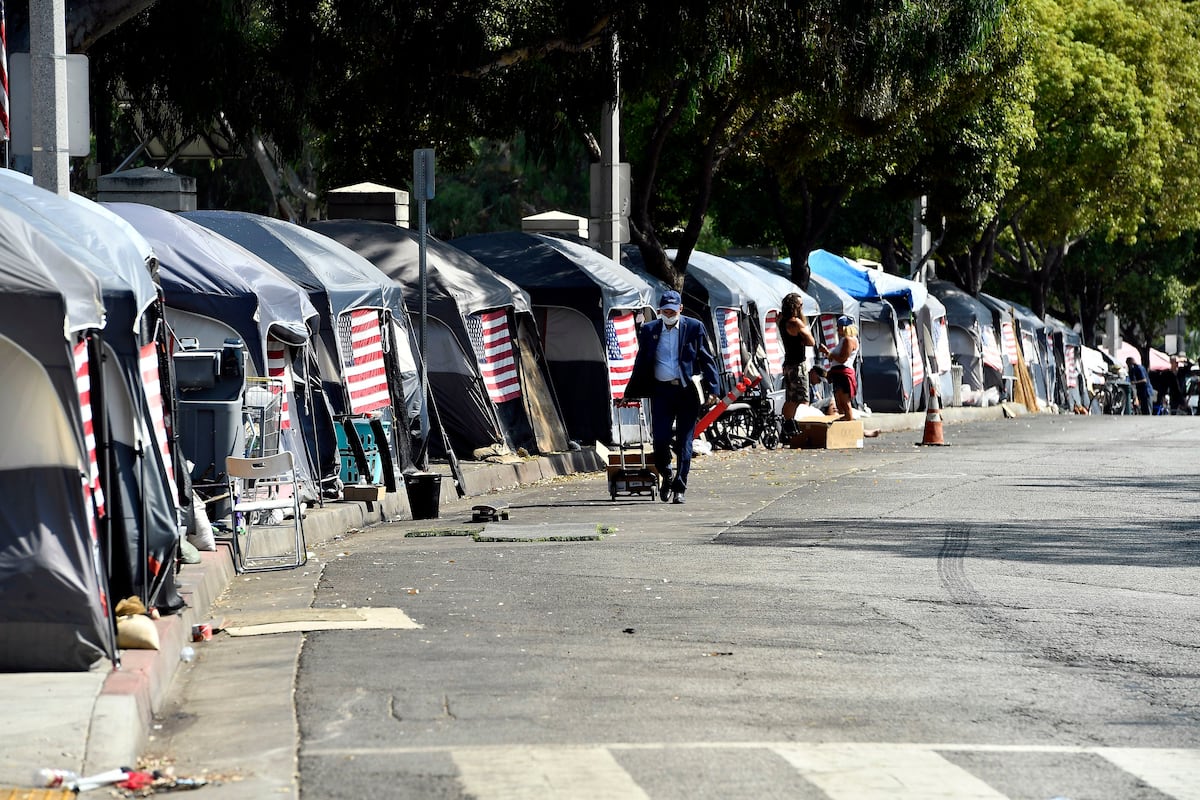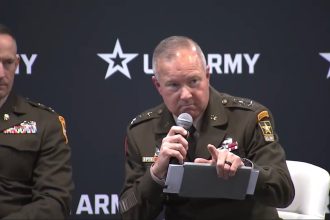When Veterans Affairs Secretary Doug Collins addressed a conference for homelessness advocates Friday, he pledged significant reforms to how his department approaches providing aid to struggling veterans, with an eye toward “finding homes for all of them.”
“Every organization I speak to, I say this is a ‘trust but verify’ situation,” he said. “We’re not satisfied with the status quo. … I’m making sure that the money and the people are set where they can help you the most. But I’ll need your help, both nationally and locally.”
Whether he’ll get robust support from homeless advocates remains to be seen.
At the National Coalition for Homeless Veterans conference in Washington, D.C., this week — an event that brings hundreds of community providers and policy planners together each year — officials voiced concerns about possible funding cuts and program disruptions that could undo years of progress in addressing the issue of homeless veterans.
RELATED
“It has been a really uncertain year for everyone,” Kathryn Monet, chief executive officer of NCHV, told conference attendees in her opening remarks Wednesday. “We see it. We hear you. And we’re doing what we can to help.”
Since taking office in February, Collins has stated frustration over the estimated 33,000 veterans without stable housing in America today. He and other conservative lawmakers have said more work needs to be done to accelerate progress on the issue, to possibly include a radical rethinking of VA outreach and support programs.
Over the last 14 years, the total number of homeless veterans in America is down more than 55%, thanks largely to a concentrated federal effort to support state and local assistance programs. But the bulk of that improvement came between 2010 and 2016, with only about a 10% drop from 2020 to 2024.
Now, some of those long-established programs could face significant overhauls.
During his speech Friday, Collins said officials have already begun working on Trump’s idea for a new “National Center for Warrior Independence” at the site, providing more housing and employment support for the estimated 3,000 homeless veterans living in the city. The comments drew strong applause from conference attendees.
But the executive order also includes other undefined proposals, including the idea of vouchers for homeless veterans and revisions to the existing federal homeless support grants.
Concerns about possible funding reductions or eliminations permeated many of the conference’s sessions. HUD-Veterans Affairs Supportive Housing grants have become a staple of federal support for community outreach efforts, and many advocates wonder if the new administration will continue to support the 20-year-old program.
Officials from the National Low Income Housing Coalition this week criticized Trump’s initial fiscal 2026 budget plans for including a 44% decrease in funding for the Department of Housing and Urban Development, saying it will “severely impact millions of low-income renters, unhoused individuals, and marginalized communities.”
And VA leaders are looking at cutting as many as 80,000 department workers — about 16% of the department’s workforce — in order to cut costs and inefficiency at the department. They have not specified whether some administrative work related to homeless outreach programs could be included in those staff dismissals.
Amid criticism of federal rollbacks, administration officials insist support for veterans will still be available, just in different, more efficient forms.
Collins on Friday did not offer specifics on what changes could be on the way for veterans housing grants, but told Military Times after his speech that community groups should not be concerned about steep budget cuts.
“We’re looking forward to continuing our commitments,” he said. “This has been a focus of mine and the president from day one.”
David Cleghorn, president of HELP Development Corp., a nonprofit that works on affordable housing projects, said many of the efforts his group has underway take several years to complete. Even well-intentioned updates to programs can cause cascading issues for planners.
“If we know that we can’t close a project for three years because we’re in line behind 10 other projects, that’s fine. We can plan for that and put our pencils down for now,” he said.
“What we can’t handle is an uncertainty of when and if resources will come, because we’re putting a ton of money into these projects long-term. If we’re working on the second phase of a project, we’ve already put hundreds of thousands of dollars into that. If the support for it comes into question, then we’re in trouble.”
For now, advocates are hopeful that the positive trend of reducing veterans homelessness over the last 15 years will continue.
“We’re making really good progress,” Monet told the crowd this week. “But as proud as we are at what we’ve done together, we’re not done. And I don’t think any of you are slowing down.”
In his remarks, Collins promised to be a partner in that work.
“The calling you all have, the calling I have, and the calling VA is to take care of every veteran we have,” he said. “That means their health care is given to them, their benefits are given to them on time, and, yes, for those that are broken, for those that are homeless, it’s time to find you a home.”
Leo covers Congress, Veterans Affairs and the White House for Military Times. He has covered Washington, D.C. since 2004, focusing on military personnel and veterans policies. His work has earned numerous honors, including a 2009 Polk award, a 2010 National Headliner Award, the IAVA Leadership in Journalism award and the VFW News Media award.
Read the full article here








